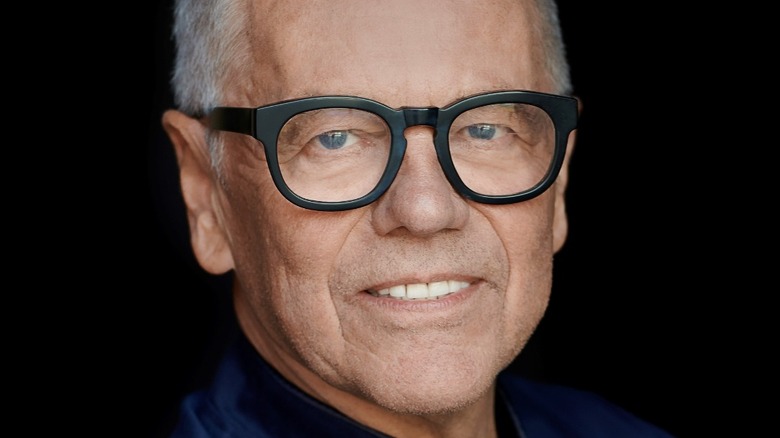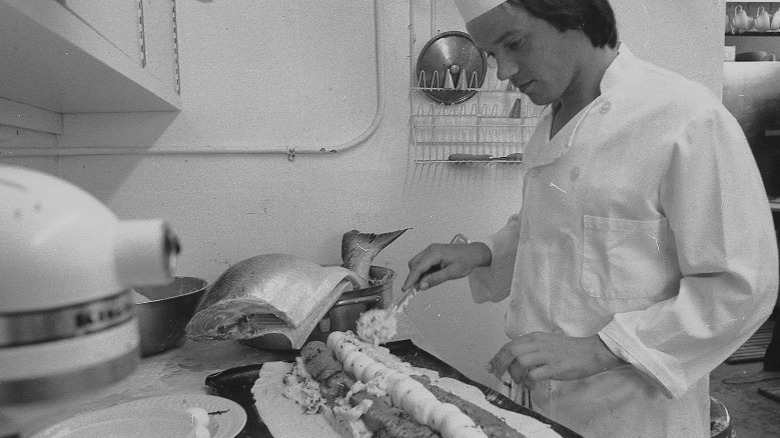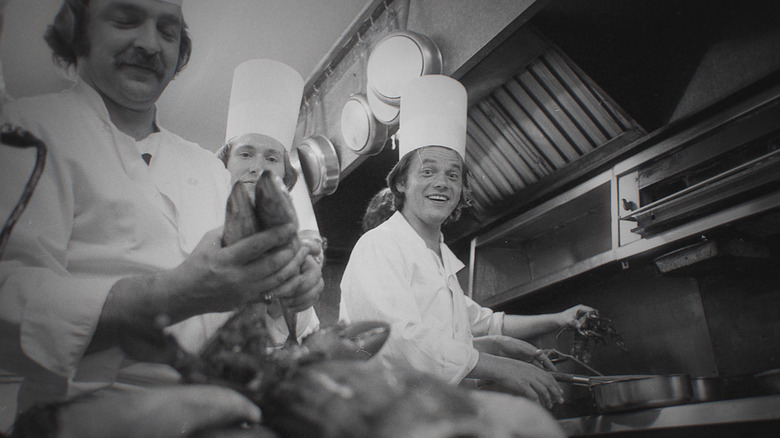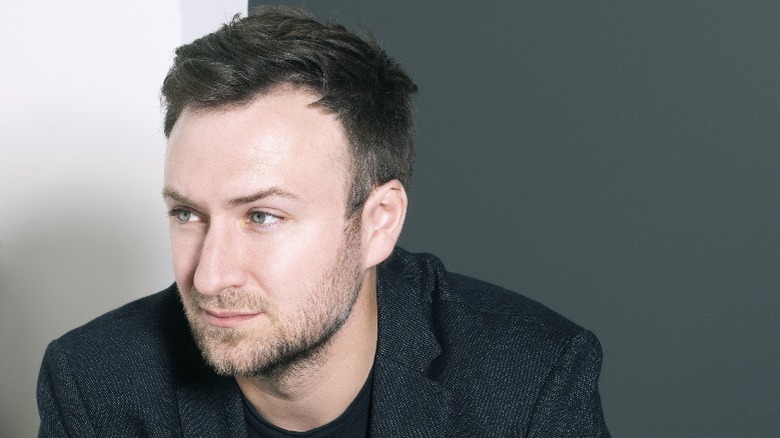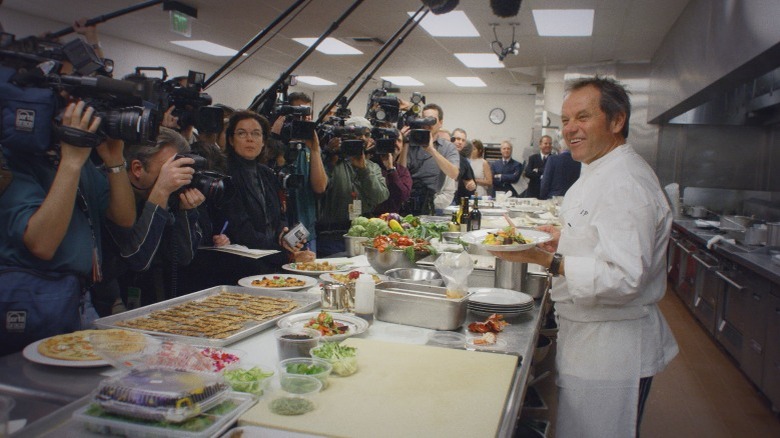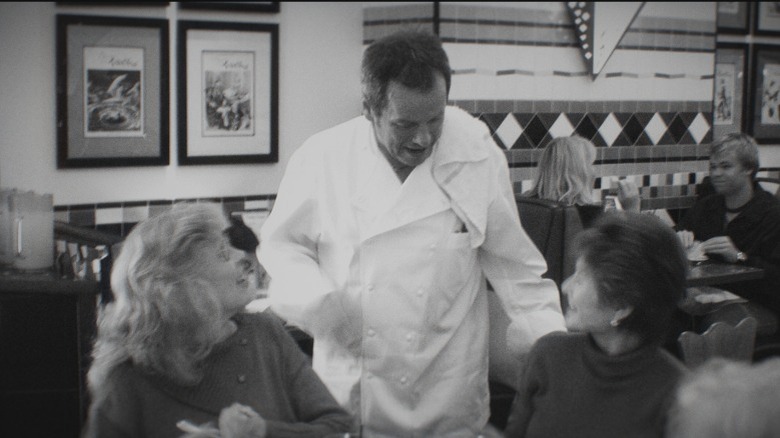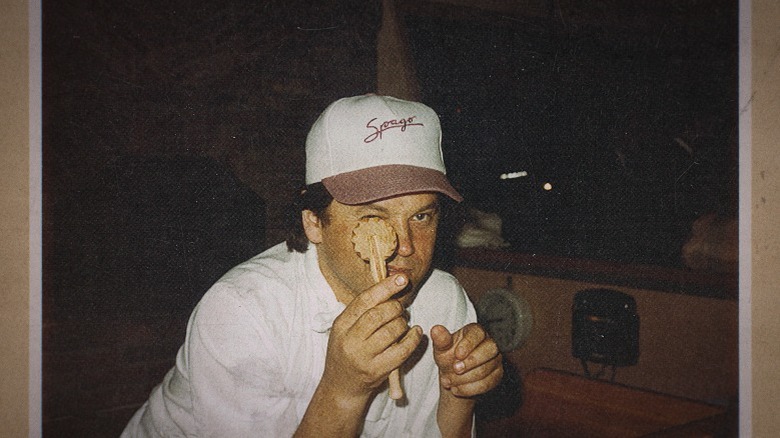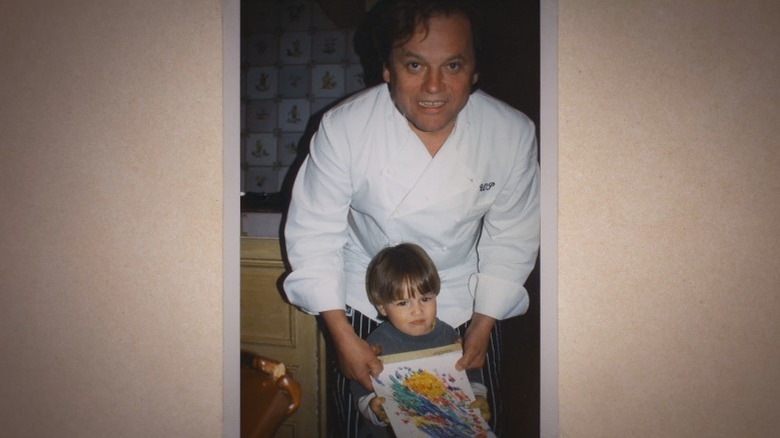Wolfgang Puck Looks Back On His Life And Opens Up About His Food Journey - Exclusive Interview
Wolfgang Puck is undoubtedly one of the biggest names in the culinary world. From his ground-breaking star-studded restaurant, Spago, to his impeccable line of chef-branded products, Puck has had an incredibly full career that continues to climb ever upward. It's true that the chef and personality is far from slowing down.
In his latest project, he teamed up with director and creator of "Chef's Table," David Gelb, to film a feature-length documentary of his life and journey to becoming the first celebrity chef. The documentary is set to premiere on June 25 through the Disney+ streaming platform. However, ahead of its release, both Puck and Gelb sat down with Mashed for an exclusive interview. Puck spoke to his life and career while Gelb shared a glimpse of his methodology for creating such moving, personal documentaries. Ultimately, viewers will likely come to find what a down-to-earth figure Puck is and the talent Gelb possesses to show Puck in his day-to-day from childhood to the present day.
Wolfgang Puck on his childhood
What initially drew you to cooking as a child?
When my mother was a professional cook in a resort hotel in the summer, we'd both stay in Hotel Linde and every summer I used to go there and help her in the kitchen. Or help the pastry chef in the kitchen. So for me, it was a lot of fun, but mainly they gave me ice cream. They gave me the end cut of the cake and that was amazing for me. So that was work even though they didn't pay me. And also, maybe outside, sometimes it was raining for three, four days in — you couldn't play really. So I played in the kitchen.
What makes Sunday night dinner so special to you?
Well, I think Sunday night dinner Shabbat for us is when the whole family is there. I tried to take off on Sunday. So to me, Sunday night dinner or Sunday lunch, sometimes it's really an important part. And I love cultures where they bring the family together, like having a Shabbat dinner on Friday night or having Sunday lunch. Like the Italians do for five hours. I think to me, the time is spent at a table and we talk about life and enjoy food and wine, whatever is so important. And I look at my childhood, the positive thing I remember was dinners like the wiener schnitzel and all these things my mother used to cook for me. And when I think of that, I said I had a lucky childhood. And when I think of my stepfather, I think I had the worst job.
Wolfgang Puck on his early days in the culinary world
What would you say the biggest struggle to get to where you are today has been?
Well, life is a journey. There are many struggles as you go along, many problems you'll have to solve. Many adverse things can happen to you. I really believe my hardest part was when I was a kid ... from maybe 5 or 4 to when I left the country. You know, when I left Austria at 17. I mean, the first Christmas I remember we were living in a one-room apartment. The stove was there, the bed was there, a table with two chairs or three chairs. That was it. And the heat in the winter, we had three feet of snow. So my mother used to get up, or my grandmother used to get up, and fire up the oven because it was with wood. The toilet was far out. So it was really so different. I remember Christmas, my grandmother bought me a box with pencils, colored pencils, and I had never seen colored pencils.
And the block to color in, that was my gift. We didn't have a Christmas dinner. We didn't have nothing because we were really poor at that time. So I think it was so different. So was I unhappy? I don't know. Maybe not more unhappy than the other kids or happier than other kids. But I think life, it's really what you make out of it. And later on, my parents built a house, brick by brick really. And my father did a lot of the maintenance himself, and I had to help him. I used to hate it. I'd much rather spend time in the kitchen instead of being in the construction business anyway, or have the farmer take care of the farm, drive the truck. It was really my pleasure sense. You know, the worst was when my stepfather was at home and I couldn't escape.
Is there a part of your journey that you would think of as the most rewarding?
I think the most amazing and important part of my journey was really when I went to a restaurant in France and I found out I worked in a restaurant in Dijon at first, and then they did a party there and they showed me the hit Michelin book. And we had one star, then there were two stars and three-star restaurants. I wrote to them and there were maybe 10 or 12 of them. And the first letter, positive letter coming back, and I thought, "I'm going to go there."
I never worked in a three-star restaurant. And when I saw Mr. Juliet, the passion he had for the ingredients, the passion he had for hospitality. Even for other things, not in a restaurant, like he had a Mozart, an art teacher come from the university, teaching him how to paint. He was painting every afternoon. He was in the studio painting. He had such a passion for life ... I think that 24 hours a day was not enough for him. He was in the restaurant during lunch. He was in the restaurant during dinner. In the afternoon he painted. In the morning, he was at the mayor's office because he was the mayor of the village. So he kept on really going. He wrote books. I mean, you name it. I feel like I don't do enough when I look at this guy. It is amazing.
David Gelb on filming the documentary
What was different in shooting this versus "Chef's Table"?
Well, I thought that we considered Wolfgang for a "Chef's Table" episode, but realized that his story and influence is just too big. "Chef's Table" itself wouldn't exist if it had not been for the kind of breakthroughs that Wolfgang had made in getting shops the kind of high-profile to be on TV in a regular way, in the first place. I mean, there was Julia Child and that was it. And then Wolfgang completely changed it and made it much more important, made shops much more important in the eyes of the public. And so, that was something that we really took into account because we want it to tell a bigger story.
We also want it to tell a story that would show the more vulnerable side of Wolfgang. So people don't take the success for granted. People think that he was just born at Spago and was instantly a success. It takes a lot of hard work and perseverance, refusing to give up, even when the obstacles seem insurmountable. And that's really one of the key lessons that we wanted the film to convey. And we thought that Disney+ would be the perfect place for this story, because it is about chasing your dream.
Your portrayals are always so candid and feel so personal. How do you accomplish that?
Well, I think that it's building a rapport and mutual trust and the things that you don't see when we do the interview. If I'm asking questions about family, I volunteer stuff about myself or things that I'm unsure about. I make the questions personal. You don't necessarily edit that stuff out in the movie, but I try to be very forthcoming about myself so that it's an exchange and not an extraction. So we try to make our interview like a conversation.
What Wolfgang wants viewers to realize
What do you want viewers to take away? And why was it so important to tell your story?
Well, I really think David did such a great story on showing me as a young person where you can imagine what it was like as a young person. But I think also for the audience out there, they're going to say, "Okay, I can see where Wolfgang came from, what he did, how he got there". And I think that's really an important part for me. And hopefully, I inspire some young kids out there who would never think [of] going into their profession of cooking. Hopefully, I inspire them to say, "You know what? I can make it and I can be, I can become the next Wolfgang."
Hopefully when young kids turn on Disney+ and see the movie, see the biography, that they're going to say, "You know what? If Wolf can do it, I can do it." I think perseverance is an important thing. Following your dream is really an important thing. And shoot high. Don't shoot like you want to be the chef in a country club, You shoot like you want to do your own restaurant. You want to create something different. I think that's really an important part to convey to young people.
Wolfgang Puck on finding Chino Ranch
In the documentary, you speak to Chino Ranch and how the produce was just so atrocious in America at the time, what was Chino Ranch doing differently then?
They were passionate. I remember their father was 80-years-old. Tom and Frank, and everybody there. The Japanese culture reveres their elders. They ask the father, what are you going to plant here? How many acres of white corn? How many acres of eggplant? How many acres of Bella? So they always sought advice from their father, how much water to irrigate, if there is no water? And when you taste it, then you say maybe the wisdom and experience from the father was translated to the son and to the table. You know, it really went down generations until it came to the plate. There is a lot of experience, a lot of hard work. That's why it tastes so delicious. And for me going for the first time there, I was like a kid in Disneyland.
That was like the most amazing thing to taste strawberries like I tasted in [the] south of France. All these varieties of heirloom tomatoes, white corn, I never really cooked with corn in Austria. We give it to the cattle. I said, "It's amazing. How do they do that?" And the say, "Well, we take a certain strain of white, silver corn, or whatever it was and grow it the right way, and put it in the right part of the land we own and everything". So I think that was a great beginning for me because I know I could drive there for two and a half hours in the morning, pick up the vegetables and come back to Spago and have our customer tastes what a real strawberry tastes like. Not like what you get in the supermarket.
Wolfgang Puck on your first trip to Spago
What's one thing people absolutely have to try when they eat at Spago?
Well, we always say, if somebody comes for the first time, maybe they should try the Spago classics. What made us really well-known from our smoked salmon pizza to our spicy tuna cones, maybe the wiener schnitzel or maybe our steam fish. They have to taste some of my Austrian influences, but also, we have so many new things and we always do interesting things, but we have pop tradition, pop innovation. So you could have whatever is just fresh today. If I go to the fish market and find great Taro, and you'll get a little Taro Tau Tau on crispy rice and you'll feel the warm rice with a little vinegar and sweetness in it, and the little spiciness and richness of the Taro, you have one bite to say, "Oh my God, this is like heaven on Earth."
Wolfgang Puck on the joy of the kitchen
What's your favorite thing about being in the kitchen?
I love food. I love customers. I love our guests. I love to work with food. I love to work with young people, get their update from what they think. My son Byron is great in the kitchen too. We've worked in some great restaurants in Europe. I often ask him, "Byron, when you go out with your friends, how you eat? How [do] you go out? You go to a restaurant?" He says, "No, we go and we hang out. We have like tapas kind of little dishes, have more cocktails than wine, and so forth." I said, "Okay, I understand that." But we have to find a good balance between both of them. And now like Byron is the new manager of Merois in West Hollywood where I started out basically in the same neighborhood and I'm excited to see him actually being successful and stressed like crazy.
And he can sleep at night. I said, "It reminds me of when I was a young kid." I didn't know where to sit the tables. Where to put the people. People called me up and [would] say, "I'm coming tonight with five people at 7:30" and they hung up the phone. I said, "But I have no table." I couldn't even call back. It was crazy.
Be sure to tune in to Disney+ on June 25 for the premiere of David Gelb's documentary of the celebrity chef, fittingly titled "Wolfgang."
